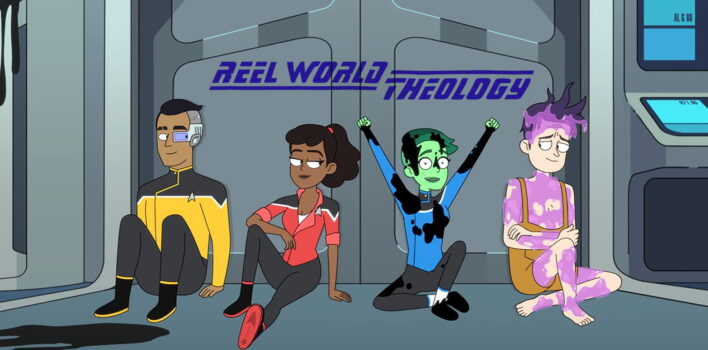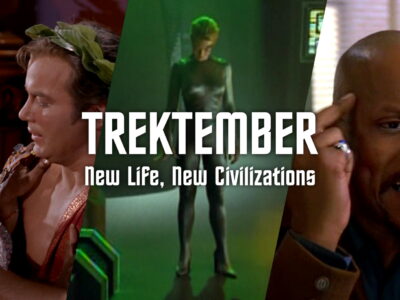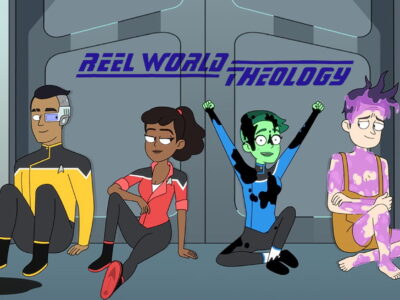“Crisis Point” – Star Trek: Lower Decks S1E09
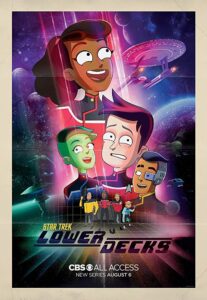 After episode 8 overdosed on fan nostalgia for The Undiscovered Country, “Crisis Point” makes it clear that there’s a competition for the episode with the most fun fan callbacks; and the prize isn’t even close to being awarded yet.
After episode 8 overdosed on fan nostalgia for The Undiscovered Country, “Crisis Point” makes it clear that there’s a competition for the episode with the most fun fan callbacks; and the prize isn’t even close to being awarded yet.
Thankfully, in addition to being packed to the gills with references and similarities to The Motion Picture, The Wrath of Khan, The Undiscovered Country (yes, again), Generations, Nemesis, and Beyond, this episode manages to inject some incredibly well-drawn character development (on par with some of the best character pieces Star Trek has done in the franchise’s history), a really solid science fiction premise, quick but deliberate pacing, and a healthy dose of humor that actually flows from the characters and the story. I’d been getting a bit frustrated by the show’s lack of any real character growth, and this episode corrects that problem handily.
Toss in some of the best voice acting I’ve heard in ages and a soundtrack I’m seriously considering purchasing, and “Crisis Point” easily ties “Envoys” and “Moist Vessel” for the best episode of this particularly strong first season.
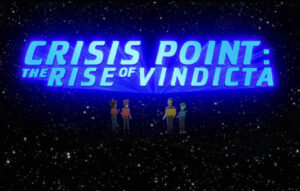 And at this point we’ve seen enough to know that everyone involved with the production of the show, from Mike McMahan to Tawny Newsome, really loves Star Trek passionately. In some previous episodes, they’ve kept that love a bit subtle; but in the penultimate episode of season one, they wear it more proudly than a Bajoran wears an earring. Far from feeling self-indulgent, it really walks the “loving and respectful” side of the line.
And at this point we’ve seen enough to know that everyone involved with the production of the show, from Mike McMahan to Tawny Newsome, really loves Star Trek passionately. In some previous episodes, they’ve kept that love a bit subtle; but in the penultimate episode of season one, they wear it more proudly than a Bajoran wears an earring. Far from feeling self-indulgent, it really walks the “loving and respectful” side of the line.
A big part of the way it does that is by focusing on Mariner’s (literal) self-reflection.
Spoiler warning: plot and ending details for “Crisis Point” follow.
You only break rules because you know that’s what everyone expects you to do. If you really were a badass, you’d do the hard thing and just be a good officer.
They’re not casting you as the villain. You are.
—Beckett Mariner as Vindicta, to holographic Ensign Beckett Mariner
One of the greatest strengths of good science fiction is that it can carve out some aspect of living a human life and let the characters and audience experiment with it in a way that reality would never allow us; like Doctor Who’s “Blink,” which examined human attention and focus in a concrete way (pun intended); or the examination of a starkly and almost universally-understood division between good and evil by way of the Force in Star Wars.
 This episode does exactly that: like the Original Series episode “The Enemy Within” before it, “Crisis Point” forces Mariner to wrestle with her inner demons externally, a perfectly-constructed holographic simulation of herself providing a means to discover what she really believes about her mother, the crew of the Cerritos, and even her very presence in Starfleet. We don’t get a chance to literally have an argument with ourselves in the real world; science fiction can do that. It was probably possible to make easier choices, ones which might’ve supported a “therapy works!” storyline without actually developing Mariner’s character; but instead, “Crisis Point” dives deep inside the role of catharsis and true self-reflection. In a half hour, while also giving us a breathtaking shot of the Cerritos rolling across a planet’s surface like a frisbee thrown by a three-year-old. Majestic.
This episode does exactly that: like the Original Series episode “The Enemy Within” before it, “Crisis Point” forces Mariner to wrestle with her inner demons externally, a perfectly-constructed holographic simulation of herself providing a means to discover what she really believes about her mother, the crew of the Cerritos, and even her very presence in Starfleet. We don’t get a chance to literally have an argument with ourselves in the real world; science fiction can do that. It was probably possible to make easier choices, ones which might’ve supported a “therapy works!” storyline without actually developing Mariner’s character; but instead, “Crisis Point” dives deep inside the role of catharsis and true self-reflection. In a half hour, while also giving us a breathtaking shot of the Cerritos rolling across a planet’s surface like a frisbee thrown by a three-year-old. Majestic.
Catharsis Point: Shortfall of Vindicta
Initially, the experiment doesn’t go well. With Mariner taking on the role of Vindicta, “vengeance personified,” she starts off with a view toward killing the holographic representation of her mother; but eventually finds out that catharsis isn’t a real solution. Tendi calls her out on it: “this isn’t you,” she says as she leaves the holodeck.
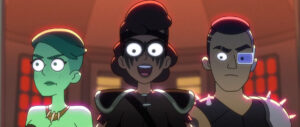 And it’s not her. Don’t get me wrong: hearing Tawny Newsome hamming it up as a Khan/Shinzon/Krall type with a serious grudge and a penchant for scenery chewing was both hilarious and delectable, but while it served the comedy and the character, it didn’t serve Mariner’s purpose. During her murderous holo-rampage she might’ve had fun, maybe even briefly felt better, but it would never have reached to the core of the problem, or healed her with the truth.
And it’s not her. Don’t get me wrong: hearing Tawny Newsome hamming it up as a Khan/Shinzon/Krall type with a serious grudge and a penchant for scenery chewing was both hilarious and delectable, but while it served the comedy and the character, it didn’t serve Mariner’s purpose. During her murderous holo-rampage she might’ve had fun, maybe even briefly felt better, but it would never have reached to the core of the problem, or healed her with the truth.
Unfortunately, that’s what catharsis is—an emotional release that provides short-term relief but offers no long-term solutions. Just like a laugh doesn’t provide lasting joy and a sob doesn’t provide eternal sadness, venting our anger doesn’t help us in the long term. And some studies even suggest it might hurt; a 2002 study published in the Personality and Social Psychology Bulletin suggests that catharsis “increased rather than decreased anger and aggression. Doing nothing at all was more effective than venting anger.”*
Catharsis doesn’t help because it doesn’t show who you really are. “Fools give full vent to their rage,” Proverbs 29 warns us; and James 1 further warns us of a certain type of folly that prompts a man to look in a mirror but, “once he has looked at himself and gone away, he has immediately forgotten what kind of person he was.”
To become a more complete person, Mariner thought she needed catharsis. But really, she needed to answer the question she’d been dodging all season: “what’s your deal?”
Thankfully, well…Mariner was there.
Contemplation Point: Introspection of Vindicta
“I may hate protocol, but I don’t hate this ship. I don’t hate the crew. I work with my best friends. The captain’s my mom. I would do anything for her.”
“Oh come on. No, you hate the captain. You complain about her non stop. It’s your whole thing.”
“Yeah, I mean she’s hard on me, right? She’s the captain and I’m a pain in the ass. But if she kicks me off the Cerritos, I’d be done in Starfleet. She’s watching out for me the only way she knows how in her [censored] overbearing mom way.”
“Oh please, the only person you care about is yourself.”
“Okay. Then why did I let you kick my ass to buy time for everyone to get off the ship before the self-destruct timer went off?”
“Wait, what?!”
—Mariner and Mariner
 I’m historically bad at self-reflection. Just ask pretty much anyone who knows me; I have trouble remembering what I was like, putting myself in my younger self’s shoes, understanding my motivations (both past and current). But I’m learning: just today, I passed the one-year mark in my current journal, which is a major record for me. Self-reflection is starting to become a habit and while I’m definitely not good at it yet, I’m learning two things from that process: first, that real healing can only come from someone who knows you well, and second, that person usually can’t be yourself.
I’m historically bad at self-reflection. Just ask pretty much anyone who knows me; I have trouble remembering what I was like, putting myself in my younger self’s shoes, understanding my motivations (both past and current). But I’m learning: just today, I passed the one-year mark in my current journal, which is a major record for me. Self-reflection is starting to become a habit and while I’m definitely not good at it yet, I’m learning two things from that process: first, that real healing can only come from someone who knows you well, and second, that person usually can’t be yourself.
A lesser show would’ve revealed that Vindicta was the hologram and the Mariner who saves her mother and the ship was the real deal. But this show goes for the far more interesting, far more complicated character beat: that Mariner is a flawed human, working on something. In order to get to the point of learning something about herself, she needed to talk to someone else; someone who knew her perfectly, with no bias. She needed to be able to open up to them and reveal her innermost thoughts, and she needed the other person to reflect those thoughts back to her. Boimler, Tendi, and Rutherford were out. Dr. Migleemo was out. Freeman was definitely out. Much as they all would want to help, they just couldn’t be a good mirror for Mariner’s self-reflection. The only person who could fill all of those roles was a perfect replica of Mariner herself.
In science fiction, that sort of thing is totally possible. Boimler’s program pulls enough data from Mariner’s logs to create a walking, talking Mariner copy that Mariner can Mariner at all she wants.
And she does, even coming literally to blows with an aspect of her personality. The breakthrough comes for the audience when the Mariner playing Vindicta systematically reveals her true self, insisting that “they’re not casting you as the villain. You are.” As willing as the real Mariner to pull no punches and leave no prisoners, holo-Mariner reveals her real feelings for the rest of the crew; something that takes real-Mariner by surprise.
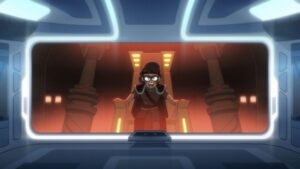 Talk therapy with a food-obsessed stranger didn’t help. Trying to stab her mom with a fallen girder didn’t help. Only taking the opportunity to look into herself through the eyes of another gave her the insight she needed to discover.
Talk therapy with a food-obsessed stranger didn’t help. Trying to stab her mom with a fallen girder didn’t help. Only taking the opportunity to look into herself through the eyes of another gave her the insight she needed to discover.
That’s part of what I’m discovering, too; through taking my self-reflections to God, I’m able to see who I really am through His eyes: a beloved child, and someone with a job to do. Through taking those self-reflections to family and friends, I can see places to grow and places to rejoice for the growth I’ve already had. It’s how I’ve become a better person over the past year, and hopefully how I’ll continue to grow, too.
You may not be able to try such direct catharsis and prove it wanting. You probably can’t separate out your “true self” and have a conversation with it directly. You definitely can’t lose a fistfight with yourself. But you can become a better person by taking your self-reflection to those who know you best.
• • •
*Side note: I’d have loved to be in that control group. “Are you angry?” “Yes.” “Hmm, interesting. …how about now?” “A little less.” “Ok, we’re done.”


